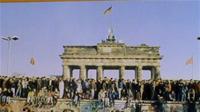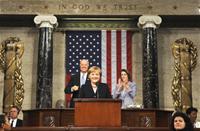The transition as a way of thinking
Adelina Marini, video:Ladislav Tsvetkov, November 8, 2009
 With the 20th anniversary of the fall of the Berlin wall (9th of November) approaching, I think more and more about the 20th anniversary of the 10th of November (the day the "Berlin wall" fell for Bulgaria). For years sociologists and political scientists in Bulgaria are explaining that the transition is over. But for me it had not started yet. Because this particular transition is a way of thinking. This is not a change of the windows at home or the furniture. This is a change in mentality which, indeed, is not that easy.
With the 20th anniversary of the fall of the Berlin wall (9th of November) approaching, I think more and more about the 20th anniversary of the 10th of November (the day the "Berlin wall" fell for Bulgaria). For years sociologists and political scientists in Bulgaria are explaining that the transition is over. But for me it had not started yet. Because this particular transition is a way of thinking. This is not a change of the windows at home or the furniture. This is a change in mentality which, indeed, is not that easy.
Of course the focus this year are not the former Soviet countries in general. The focus is Germany. Not only because the Berlin wall was there but because Germany has been unified which, in the global context 60 years after the end of WWII, posed a lot of questions but a lot of answers as well.
This text is not about Germany but Germany is a inseverabale part of it. Last week the German chancellor Angela Merkel registered in history as the second German chancellor to address the Congress. The first was Konrad Adenauer. But Ms. Merkel, born in the German Democratic Republic as a daughter of a pastor, is the first chancellor to address both chambers of Congress.
chancellor Angela Merkel registered in history as the second German chancellor to address the Congress. The first was Konrad Adenauer. But Ms. Merkel, born in the German Democratic Republic as a daughter of a pastor, is the first chancellor to address both chambers of Congress.
Her speech was simple, honest and was uttered as if by an ordinary citizen who is finally free. She explained to senators and congressmen with simple words what freedom actually is. It is to have access to books, movies, the freedom of travel, the freedom of speech, to be able to buy as simple a thing as jeans. The German chancellor spoke with gratitude to the United States of America - the land of unlimited opportunities which was a dream for us 20 years ago, we could imagine what America was, to aspire to it.
 However, Ms. Merkel did not talk about this only. She also spoke about the global situation 20 years later: about Iran, the Middle East, the climate change, tolerance, Afghanistan and Pakistan. The transition from the personal confession about freedom toward the political context for me meant a clear message - only those who know what it is not to have freedom can fight for it.
However, Ms. Merkel did not talk about this only. She also spoke about the global situation 20 years later: about Iran, the Middle East, the climate change, tolerance, Afghanistan and Pakistan. The transition from the personal confession about freedom toward the political context for me meant a clear message - only those who know what it is not to have freedom can fight for it.
Of course I'm far from comparing Bulgaria with Germany. But after that speech a lot of thoughts poured over me - why do I not feel happy 20 years later? Why cannot I, like Angela Merkel, share my personal feelings in the perspective of them being in the past? Why for me my personal feelings have still not happened, they are in the future?
(in this video there is a background speech of the Soviet times ruler of Bulgaria Todor Zhivkov. You will see a translated text of his words after the whole article)
The only answer I have for now and which is unpleasant for me to utter is that we haven't fought for our freedom. It is not ours. It is a foreign merit which we can but do not benefit from.
Angela Merkel only less than 2 weeks ago won a second term as a chancellor of united Germany. The analysts unanimously say that her election campaigns are the most boring in the world but, nevertheless people want her. Why? I don't know the answer but I guess that it is because the Germans believe a person they know who is was and who she is now.
Do we know who our prime minister Mr. Boyko Borisov is? I myself don't. I see that he is a self-confident person, I see that he is perceived as a person from the people; they say about him that he was a fireman, that his grandfather was murdered by the communists, that he has a black belt in I don't remember which combat art, that he had a guardian company, that he was a bodyguard of Todor Zhivkov, the ex tsar Simeon Saxecobourggotta, that ... But I don't know his personal story about the 10th of November.
I don't know the personal story of all the other politicians, most of the authors, journalists, sociologists, political scientists. That is why I don't believe them. And I think that I am right not to believe them because non of them managed to convince the society that freedom is something we have to fight for on our own. It is not for granted. Freedom is not the EU funds that are aimed at improving our infrastructure or for us to fight corruption. Freedom is the knowledge that we need roads and that is why we have to build them because this would help the economy, trade and our personal freedom to travel.
Freedom is not someone to start fighting the corruption. Freedom is to stop giving bribes to traffic police because one day someone that had given a bribe might kill your child or yourself in the street. Because when you give, someone else also gives and thus you're not helping yourself to have a work done faster you only contribute to the chaos and no one can actually have his or hers work done. Because when you rush late because you haven't estimated how much time you have and cross at a red traffic light, then you see that there are tens of people that are the same as you are - late. And then the cars in the opposite lane become more and more and you will have to wait either way.
And finally, freedom is not someone to tell you that you are free. Freedom is to believe that you're free. To know that it depends on you and you alone.
That is why for me the transition had not happened yet and soon will not even start. That is why a lot of people, born free, escape to free countries - where they can work; where there is rule of law; where they know that they are protected because there is no one greater than the law. Where the lay really protects you and you know that if your car is stolen the thief will not be yet another policeman but the perpetrator will be caught and convicted and you will sleep well.
Because of all these thoughts I don't feel the 10th of November as a holiday. But I watch with excitement and a little envy the preparations for the 20th anniversary of the 9th of November. I am glad that there are people in Europe who will feel happy because for 20 years they have been free and did not let anyone to lie to them about it.
TEXT OF PARTS OF DIFFERENT SPEECHES OF TODOR ZHIVKOV WHICH IS IN THE VIDEO:
"Is the transition from capitalism to socialism possible? Has the situation ripened for this or not? This is the truth, this is the truth. They did not dare say that the situation is now ripe for a transition to socialism. Why? Because socialism can only be after capitalism, post-capitalism. It cannot be before capitalism. This is the essence of the idealism of Marxism and Leninism. They thought that only 1 or 2 countries will become socialism. But they were wrong... And if do not take this as a basis we will go nowhere. We will make a big mistake. That is why our leadership, especially the politburo, firmly supported this position that we have to deal with an underdeveloped society which needs those quantitative and qualitative potential that will gradually transform it into a socialist society. And all this given the fact that the situation is now ripe for the rest of the capitalistic countries to walk this path. But let's not spread too much. Socialism is a prematurely born child. This is the simple truth - a prematurely born child".